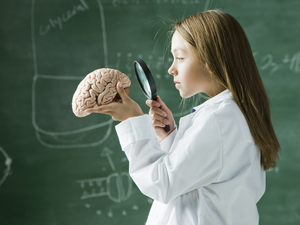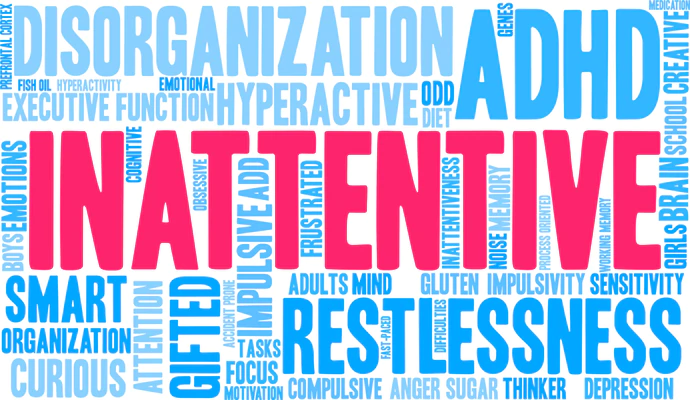Do you have trouble staying focused? Are you always losing your things? Do you find yourself daydreaming a lot? If so, you might be suffering from inattentive ADHD. This is a condition that affects millions of people across the globe, but many of them don’t know they have it. In this blog post, we will discuss everything you need to know about inattentive ADHD. We will talk about the symptoms, treatment options, and ways to cope with the condition. So if you think you might be suffering from inattentive ADHD, keep reading!
Contents
Defining Inattentive ADHD

Inattentive ADHD is a subtype of attention deficit hyperactivity disorder (ADHD). It is sometimes referred to as “quiet ADHD” because people with this type of ADHD tend to be less disruptive than those with other types of ADHD. However, make no mistake – inattentive ADHD can be just as debilitating as any other type of ADHD. The main difference is that people with inattentive ADHD are less likely to act out and more likely to internalize their symptoms.
This form of ADHD is characterized by six main symptoms:
- Trouble paying attention
- Easily distracted
- Forgetfulness
- Disorganization
- Procrastination
- Daydreaming
If you suffer from four or more of these symptoms, you may be diagnosed with inattentive ADHD. It is important to note that everyone experiences these symptoms from time to time. However, people with inattentive ADHD experience them on a much more frequent basis. These symptoms can cause problems in all areas of life, including school, work, as well as personal relationships.
Symptoms
There are a few key symptoms that are associated with inattentive ADHD. These include:
- Trouble paying attention
- Low attention span
- Weak memory
- Disorganization
- Trouble following instructions
- Zoning out
- Not paying attention to detail
- Losing belongings
- Distraction by stimuli
- Prone to boredom
- Missing deadlines
- Sensory overloads
- Appearing to be not listening to something when asked to pay attention
- Difficulty in completing tasks
It is important to note that these symptoms may manifest at different intensities and present themselves in different ways. Mental illnesses such as ADHD don’t look the same for two people and individual differences must be acknowledged.
Causes
The exact cause of inattentive ADHD is unknown. However, there are several risk factors that have been linked to the condition. These include:
- Genetics: ADHD tends to run in families, so you are more likely to develop it if you have a family member with the condition.
- Environment: Exposure to certain environmental toxins has been linked to an increased risk of developing ADHD.
- Premature birth: Babies who are born prematurely are more likely to develop ADHD.
These are just some of the possible causes of inattentive ADHD. It is important to remember that no single factor can cause the condition – it is believed that a combination of genetic as well as environmental factors plays a role in its development.
Effects On Everyday Life
Inattentive ADHD can have a significant impact on everyday life. The main symptoms of the condition – trouble paying attention, low attention span, disorganization, and forgetfulness – can make it further difficult to function in school, work, and in personal relationships. People with inattentive ADHD often find themselves underachieving in school or struggling to keep up at work. They may also have difficulty maintaining healthy personal relationships due to their symptoms.
Inattentive ADHD can also lead to other problems such as anxiety and depression. This is because people with the condition often feel like they are not meeting their full potential. This can lead to feelings of inadequacy and low self-esteem. If left untreated, inattentive ADHD can have a significant negative impact on your life.
Treatment

There is no one-size-fits-all approach to treating inattentive ADHD. The best course of treatment will vary from person to person. However, there are a few common treatment options that are often used to treat this condition. These include:
Therapy
Cognitive-behavioral therapy (CBT) is often used to treat inattentive ADHD. This type of therapy can also help you learn how to manage your symptoms and cope with the challenges of the condition.
Behavioral Intervention
Several different behavioral interventions can be used to treat inattentive ADHD. These interventions can help you learn how to manage your symptoms and make lifestyle changes that will improve your overall well-being.
Medication
Several different medications can be used to treat inattentive ADHD. The most common are stimulants, which can help improve focus and concentration. However, there are also non-stimulant options available. Medication for ADHD helps by regulating the chemicals in your brain that are responsible for focus and concentration. The most commonly known medications include Adderall, Ritalin, and Vyvanse.
Self Help Tips
- Life changes: Making some lifestyle changes can also help lessen the symptoms of inattentive ADHD. These changes might include things like getting more exercise, eating a healthy diet, and getting enough sleep.
- Parenting Strategies: If you have a child with inattentive ADHD, there are a few parenting strategies that can be helpful. These include establishing routines, setting limits, and providing positive reinforcement.
- Eliminating distractions: One of the best ways to cope with inattentive ADHD is to eliminate distractions. This might mean turning off the TV, putting away your phone, and avoiding other things that can take away from your focus.
- Making time for relaxation: It’s important to make time for relaxation when you have inattentive ADHD. This can help reduce stress and anxiety. Relaxation techniques such as yoga, meditation, and deep breathing can be helpful.
- Building a support system: Having a strong support system is crucial for managing any chronic condition. Find friends or family members who understand what you’re going through and can further offer emotional support.
- Staying organized: One of the best ways to cope with inattentive ADHD is to stay organized. This can help you keep track of your things and further make sure you’re completing tasks.
- Making lists: Lists can be a helpful tool for people with inattentive ADHD. Lists can help you remember what you need to do and keep track of your progress.
- Taking breaks: When you’re feeling overwhelmed, take a break. Go for a walk, read a book, or just take some time to relax.
- Finding an outlet: Having an outlet for your energy can help manage inattentive ADHD. Some people find that exercise helps them focus their energy. Others enjoy activities such as painting or writing.
Alternative Treatments
Several alternative treatments are effective in treating inattentive ADHD. These include things such as:
- Yoga: Yoga can help improve focus and concentration.
- Meditation: Meditation can help to calm the mind and reduce stress.
- Acupuncture: Acupuncture is effective in treating several conditions, including ADHD.
- Aromatherapy: Aromatherapy can help in reducing stress in addition to anxiety.
- Massage therapy: Massage therapy can help to relax the body as well as the mind.
- Mindfulness training: Mindfulness training can help to improve focus and concentration.
- Biofeedback: Biofeedback can help to improve focus and concentration.
- Chiropractic care: Chiropractic care is effective in treating several conditions, including ADHD.
- Dietary changes: Making dietary changes is often recommended for people with inattentive ADHD. Eliminating processed foods and eating more whole foods can also help improve symptoms.
- Supplements: Several different supplements are effective in treating ADHD. These include omega-three fatty acids, iron, magnesium, as well as zinc.
- Herbal remedies: Several different herbal remedies are effective in treating ADHD. These include ginkgo Biloba, lemon balm, as well as chamomile.
- Homeopathy: Homeopathy is an alternative treatment that uses diluted substances to treat conditions. Homeopathic treatments for ADHD include belladonna as well as Ignatia Amara.
- Probiotics: Probiotics are live bacteria that can help improve gut health. Probiotics are also effective in treating several conditions, including ADHD.
If you think you might be suffering from inattentive ADHD, it’s important to see a doctor or mental health professional. They will be able to give you a diagnosis and talk to you about treatment options. Furthermore with the right treatment, you can learn how to further manage your symptoms and live a happy, healthy life!
Conclusion
In conclusion, inattentive ADHD is a real condition that affects many people. It’s important to seek help if you think you might be suffering from it. With the right treatment, you can manage your symptoms and live a happy, healthy life!
For more information, please contact MantraCare. ADHD is a neurodevelopmental disorder characterized by difficulty in paying attention, hyperactivity, and impulsivity. If you have any queries regarding Online ADHD Counseling experienced therapists at MantraCare can help: Book a trial ADHD therapy session


